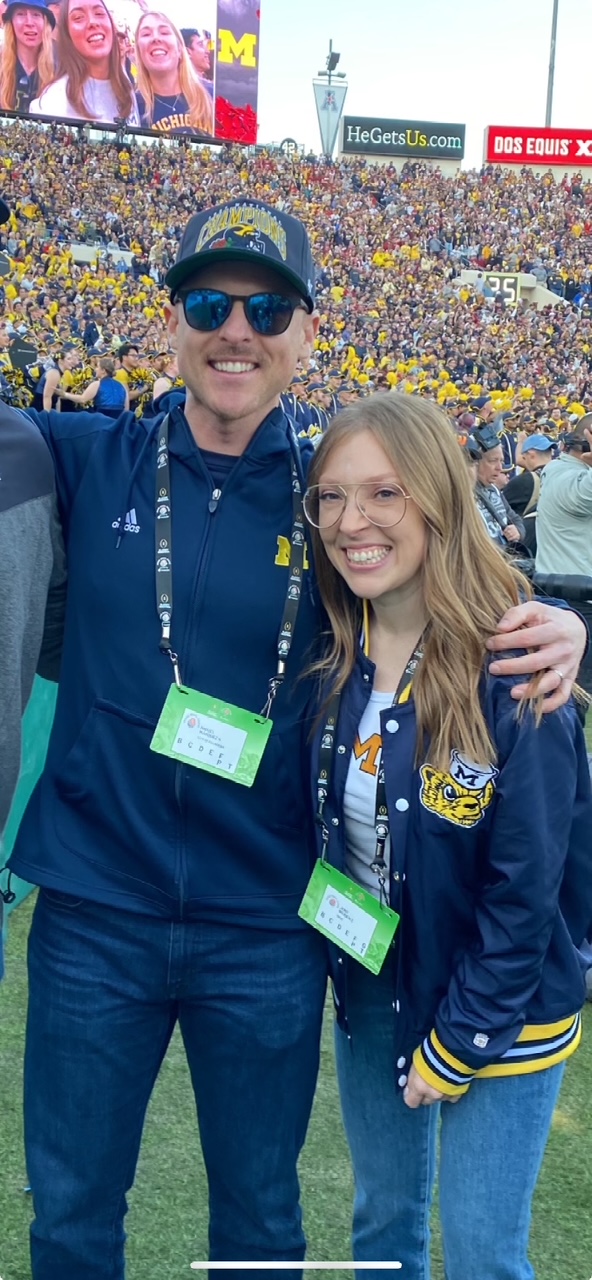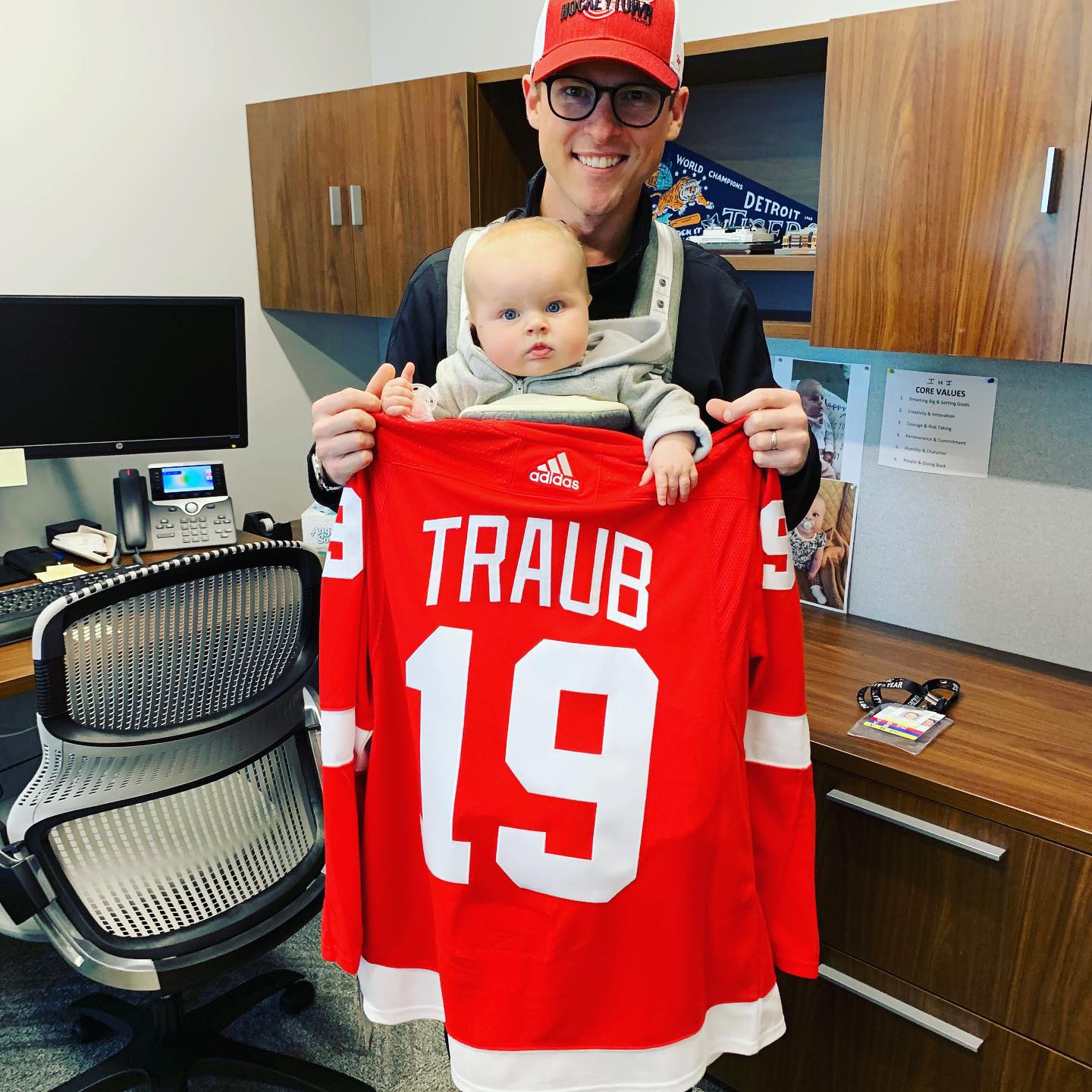
 Back to News
Cool Jobs
Back to News
Cool Jobs
Coming into sports through the “side door” of real estate

Even though it’s been over a decade since Taylor Traub (MS SM ‘11) graduated from the University of Michigan School of Kinesiology with a master’s degree in sport management, he still keeps in touch with several of his classmates, texting them every week.
That’s because the lessons he took from the school have stayed with him. The relationships that he formed on campus and the opportunity to develop analytical skills were “the most profound experiences” in Ann Arbor, says Traub, who now works for Ilitch Sports + Entertainment (IS+E), which owns the Detroit Tigers and the Detroit Red Wings.
At Ilitch Sports + Entertainment, Traub is vice president of business analytics, where he is responsible for leading data strategy and other key initiatives across the organization, namely in situations when analytics can be used to identify growth opportunities and enable solutions. Traub and his team also partner with IS+E’s ticket sales division to help them with pricing, inventory management, and revenue maximization, and to develop strategies for sponsorships, parking, and concessions.
“We plug into all key areas of our business,” Traub says. “We're similar to internal consultants in a way.”
It is, undeniably, a cool job. But it took Traub eight years after graduating from U-M to find his way to IS+E as he worked in various real estate jobs, keeping the lessons he’d learned in SM at the forefront and waiting for an opportunity to land a job in the sports industry.
“U-M’s classes really shaped how I think about problems,” he says. “I feel very well equipped... like there isn't anything that could get thrown at me that I’m not armed to figure out. To me, that is very, very empowering.”

Traub and his sister, a fellow U-M grad, on the field at the Rose Bowl in 2024.
The intersection of all his interests
Traub’s love of the university is tied up with his family history. His mother went to Pioneer High School near the Ann Arbor campus, and his grandfather owned a men’s clothing store on Main Street for 50 years. Traub remembers going to see the Wolverines at the Rose Bowl with his dad and sister in 1998 when he was 11 years old.
“Ann Arbor and the university community is very welcoming and gregarious,” Traub says. “Everyone is very humble and willing to help each other. You don't always get that vibe at different college campuses.”
After Traub graduated with a bachelor’s degree in English from Oakland University in Rochester, Mich., where he was also on the baseball team, he wasn’t sure what to do next. He’d toyed with the idea of attending law school, but some pre-law courses helped him realize that wasn’t the right path. However, he discovered the Sport Management Program (SM) at the U-M School of Kinesiology and thought it would be a great fit given his experience as a collegiate athlete.
At Michigan, one of Traub’s favorite sport management professors was Mark Rosentraub, director of the Center for Sports Venues and Real Estate Development, who taught a course about the impact of sports stadiums and arenas on a region's economic development. The class was “a really cool intersection of all the things I was interested in: sports business, law, public policy, finance — all these concepts,” Traub says.
Rosentraub’s course inspired Traub so much that he chose to pursue a second master’s degree at U-M in urban planning with a focus on real estate development.
“I knew that I wanted to work in the sports industry, but that I didn't want to go directly into ticket sales or marketing,” Traub says, “so pursuing a second master’s degree seemed like a good strategy to round out my skill set for a path in real estate and eventually back into sports.”
But after Traub graduated, the job market was thin. So he “leaned into the real estate side” of his time at U-M and took a consulting job in Washington, D.C., followed by work on the equity side of the business managing real estate portfolios.
Getting his foot in the sports industry
Sports remained his first love.
“The plan was always, ’If I can develop this skill set outside of sports, maybe I'll find an opportunity to come in through the side door,’” Traub says.
When Traub and his wife moved back to Detroit in 2016 to be closer to family, he continued to work in real estate, this time at development firm Bedrock Detroit. But it moved him closer to the position that would achieve his goal of working in sports: director of FP&A [financial planning and analysis] at IS+E.
“I found out about the IS+E role through a general job posting. Once I saw it, my eyes lit up,” Traub says. “I was like, ‘Is this it? Is this my opportunity to come in the side door and really get my foot in the industry?’ And thankfully, it came to fruition.”

Traub shortly after securing his first role at IS+E with his oldest daughter.
As director of FP&A, Traub supported all four IS+E verticals: the Red Wings, the Tigers, parking, and the live events business. One of his most significant projects involved creating five-year plans for each business by using data analytics to devise strategies that would help meet company objectives — a skill he’d developed in classes at U-M and honed during his time in real estate.
For instance, in his plan for the Red Wings, Traub projected all of the team’s revenues and expenses in a presentation for leaders such as Steve Yzerman, a Red Wings legend and now the team’s general manager.
“It was a pretty incredible experience, where I got to apply a lot of the technical skills that I learned in Ann Arbor and build out something that I could present to a room full of executives, who helped us talk through and think through the health of our business and the direction we’re taking the Red Wings,” Traub says.
Traub was promoted to his current role around two years ago. He says, simply, that he loves what he does.
"I think this might sound a little bit preachy, but part of why I love to work in sports is there are a lot of things in the world today that can be very divisive,” Traub says. “I think we experienced a lot of that in our own ways throughout the pandemic.”
“Sports and entertainment is such an amazing way to bring people together from different walks of life to celebrate achievement and unique experiences,” he continues. “It’s very unifying in that way and very gratifying. That’s a key element of our business: to bring people together.”